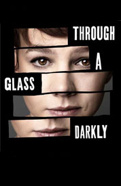Through a Glass Darkly Scribe Jenny Worton on Tackling Ingmar Bergman and Being ‘Mesmerized’ By Carey Mulligan
About the author:
As the Artistic Associate of London’s acclaimed Almeida Theatre, Jenny Worton is constantly surrounded by the works of other playwrights. In her off hours, however, Worton enjoys creating theatrical works of her own. Her adaptation of Ingmar Bergman’s 1961 film Through a Glass Darkly played the Almeida in 2010 and is now making its off-Broadway debut courtesy of Atlantic Theater Company, with Oscar nominee Carey Mulligan leading the cast as a mentally ill young woman. Below, Worton describes the process of transferring a well-known film to the stage, the excitement of working in New York and the many talents of her show’s leading lady.
![]()
From Stockholm to New York, via London—the journey of a play.
The day before rehearsals started for the New York production of Through a Glass Darkly, I went for a walk around the theaters on Broadway and ended up at Times Square. I had never been there before, and somehow I had just assumed that it would resemble London’s Piccadilly Circus. It doesn’t. There’s a question of scale which makes them incomparable, and it was standing in the center of Times Square in April that I fully realized I was a small lady in a very big city.
I need not have felt nervous, because the Atlantic Theater Company could not have welcomed me with more warmth or generosity. That first day of rehearsals was indicative of the whole process: In the afternoon we sat, as a company, and watched the film. Some of the actors had seen it, some had not; I hadn’t seen it since the play’s first production in London and I watched it that day like I was visiting a house I grew up in. What I love about this film is the way in one scene it deals in those minor tragedies of family life and then, in the next, takes its audience to a parallel reality so visceral that we can’t help but accept its existence. I remember feeling like I knew this story the way you know the plan of a house that no longer exists; you can still move through its rooms. I also remember thinking that I had not always felt this way.
Back in 2008, London’s Almeida Theatre was invited to bring a rehearsed reading of the script to the inaugural Bergman Theatre Festival in Stockholm. The invitation came through producers Andrew Higgie and Garry McQuinn, who were the only people ever to receive Bergman’s personal permission to adapt one of his films. So in the spring of 2009, I found myself on a panel of experts talking about Bergman and adaptation. At this point I had only seen three Bergman films and whilst I had adapted from film to stage before, the reading we’d done of Through a Glass Darkly had been very much a first draft.
The panel was held in English, mercifully, though everyone else was speaking in their second if not third language. I look back on it now, two productions later, and can remember very little of what I said but very much of how little I felt I knew. That reading was almost a complete transposition of the film. I had conflated smaller scenes into larger wholes and worked the dialogue in such a way as to allow for the natural structure of the scenes to be more apparent. Otherwise, I had done very little to the film script. The reading lasted 42 minutes and, to the amazement of the actors who had had two days of rehearsal, received a standing ovation. From there, the script grew and developed and the following year it went on in London at the Almeida, directed by Michael Attenborough, with a wonderful cast led by Ruth Wilson.
Earlier this year, in preparation for the New York production, I met director David Leveaux, and he told me that he had doubts about the last, briefly redemptive scene between father and son (a reservation shared by Bergman, who later disowned the final scene). David gave me a great note: He said that Karin goes on a journey at the end of the play and that when she returns she is changed. He asked me to look at the last scene and think of Karin as a traveler who comes back to tell us what she has witnessed.
On that first day of rehearsals, I heard Carey Mulligan read a slightly changed ending and I was mesmerized by what she brought to it. And I realized that this was the biggest journey of all. Over the course of the last three years, the text has travelled, but what has affected it most are those particular qualities that actors bring to what’s on the page. When I came back for previews, I saw Bergman’s story again, and as if for the first time, in the hands of an inspirational cast: Carey Mulligan, Ben Rosenfield, Jason Butler Harner and Chris Sarandon.
Related Shows
Articles Trending Now
- Good Night, and Good Luck, Starring George Clooney, Opens on Broadway with Glitz and Glam But No Egos
- Adrienne Warren and Nick Jonas Open The Last Five Years, Jonathan Groff Dances as Bobby Darin and More on The Broadway Show
- All Aboard for Pirates! The Penzance Musical: The Swashbuckling Saga of Gilbert and Sullivan’s Comic Operetta
